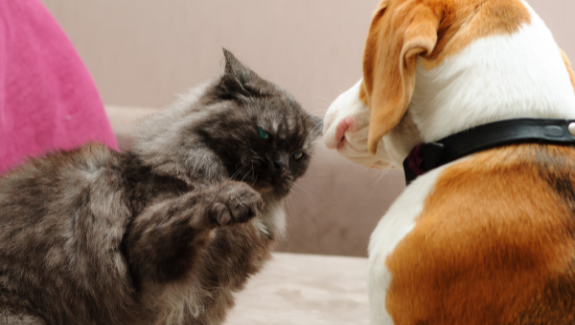
Cats and Dogs at Home: How to Prevent Pet Fights
July 08, 2022Are you a pet owner struggling to maintain peace between your cats and dogs at home? Fret not! This article provides valuable insights and practical tips on how to prevent pet fights and foster a harmonious coexistence.
1. Understand Your Pet's Behavior

To effectively manage the relationship between your cats and dogs, it's crucial to understand their behavior. Cats and dogs have distinct instincts and communication styles. By grasping these differences, you can proactively address potential conflicts.
2. Gradual Introduction

When introducing a new pet to your household, take it slow. Begin by allowing your pets to sniff each other's scents through closed doors. Gradually progress to controlled face-to-face encounters in a neutral space. This gradual introduction helps reduce territorial aggression and allows them to acclimate to each other's presence.
3. Provide Separate Spaces
Creating separate spaces for your cats and dogs is essential. Ensure each pet has their own designated area, complete with food, water, toys, and a comfortable bed. These spaces serve as safe retreats, allowing them to relax and escape potential tension.
4. Supervised Interactions

During the initial stages of integration, closely supervise interactions between your pets. This supervision ensures you can quickly intervene if any signs of aggression or stress arise. Reward positive behavior and redirect negative behavior with distractions or commands.
5. Positive Reinforcement Training

Training plays a pivotal role in preventing pet fights. Use positive reinforcement techniques to teach your pets basic obedience commands and encourage good behavior. Rewarding desirable behavior helps foster a positive association and reduces the likelihood of conflicts.
6. Enrichment Activities
Engaging your pets in stimulating activities helps alleviate boredom and redirect their energy. Offer interactive toys, puzzle feeders, and playtime sessions to keep them mentally and physically stimulated. A tired pet is less likely to engage in confrontations.
7. Maintain Consistency
Establishing a consistent routine for feeding, exercise, and playtime is crucial. Consistency helps create a sense of stability, reducing stress and potential conflicts. Ensure each pet receives individual attention and quality time with you to prevent feelings of neglect.
8. Seek Professional Help if Needed
If you're facing persistent pet conflicts or if aggression escalates, consult a professional animal behaviorist or a veterinarian experienced in pet behavior. These experts can assess the situation and provide personalized advice and guidance tailored to your pets' specific needs.
Salmon Oil for Dogs and Cats
Salmon oil is a good source of omega-3 fatty acids, which are essential for both dogs and cats. Omega-3 fatty acids can help to improve skin and coat health, reduce inflammation, and support cognitive function. Some studies have also shown that omega-3 fatty acids can help to reduce anxiety and aggression in dogs and cats.
If your dog or cat is exhibiting signs of misbehavior, such as chewing on furniture, barking excessively, or urinating or defecating outside the litter box, adding salmon oil to their diet may be helpful. However, it is important to note that salmon oil is not a cure-all for misbehavior, and it is always best to consult with your veterinarian to rule out any underlying medical conditions.
Here are some of the ways that salmon oil can help to prevent misbehavior in dogs and cats:
- Improve skin and coat health. The omega-3 fatty acids in fish oil are essential for maintaining healthy skin and coat. A deficiency in omega-3 fatty acids can lead to dry, itchy skin, flaky fur, and hair loss. When your pet's skin and coat are healthy, they are less likely to scratch and bite themselves, which can reduce the risk of destructive behavior.
- Reduce inflammation. Omega-3 fatty acids have anti-inflammatory properties. Inflammation can contribute to a variety of health problems in dogs and cats, including arthritis, allergies, and behavioral problems. By reducing inflammation, salmon oil can help to improve your pet's overall health and well-being, which can lead to a decrease in misbehavior.
- Support cognitive function. The omega-3 fatty acids in salmon oil are essential for the development and function of the brain. They can help to improve memory, learning, and concentration. In dogs and cats, omega-3 fatty acids have been shown to reduce anxiety and aggression.
Maintaining harmony between cats and dogs at home requires patience, understanding, and proactive measures. By following these practical tips and seeking professional guidance when necessary, you can create a peaceful environment where your pets can coexist happily. Remember, with the right approach and consistent effort, you can avoid pet fights and foster a loving bond between your furry friends.
Remember to visit Vital Pet Life's blog for more insightful articles on pet care, training, and overall well-being.
